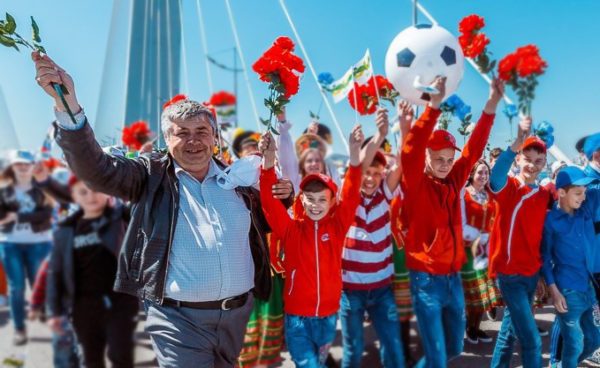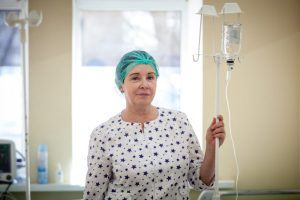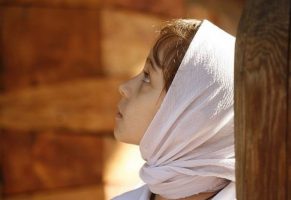Having lived in an orphanage for some time, every child starts to call the director their father. Igor Zhovnirenko, Director of an Ussuriysk orphanage, always spends time with children: he sings in a choir, dances, harvests potatoes, and helps seniors to prepare for the Unified State Exam (USE) in the evenings.
Children Run to Me After School
Igor Zhovnirenko has a clear system both at work and at home. In the morning, he takes his grandson to a kindergarten and picks him up in the evening. At 8 a.m., he is already in the orphanage. He checks bedrooms and the refectory, makes sure that everyone has their breakfast and goes to classes in a good mood.
– If a child is angry or sad, you can see it in their eyes or walk right away. I can give them a hug or tell a joke and their mood brightens. My children go to the school near the orphanage. After school, they come to my office to do their homework. The foster children also run to me after school to tell me what their day was like and to show me their grades, – the director said.
Mr. Zhovnirenko has a degree in physics and mathematics, therefore he helps seniors to prepare for the USE: they gather at his office or in a big classroom and study. He tries to finish his administrative work by six p.m., so that he has time to spend with the children. The director experiences success and failure together with the pupils:
– It is unavoidable. Moreover, it is honest, not forced. I work, because I feel needed. The kids are happy to see me in any situation, even if they get a D at school. They know that I will listen, understand and help them. When one enjoys one’s work, it is life’s great joy. I do not really understand what rest means. When I want a distraction, I cook delicious pilaf or borsch. Sometimes I can go to the sea for a day, but spending time there longer would already be hell for me.
Incidentally, Mr. Zhovnirenko goes on vacation with foster children too. Having found sponsors, he went with the children to St. Petersburg, Crimea, San Francisco, and several times to China. The director personally accompanies the children and misses them and his own children a great deal while on business trips. He mentioned that “he is on the phone nonstop”.
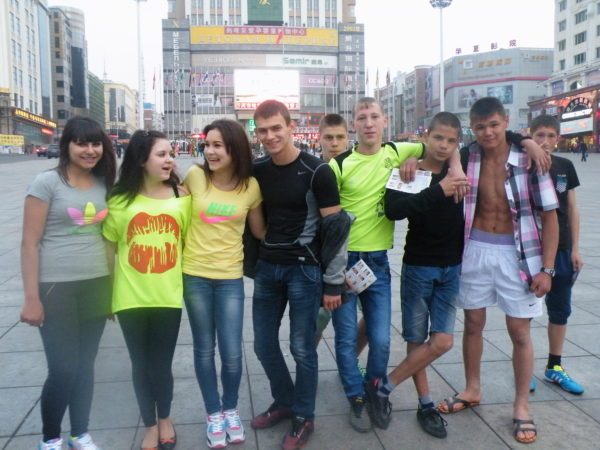
A Trip to China
It Is Difficult to Be a Father to All
Mr. Zhovnirenko has three children, the eldest of whom was adopted. At the time of adoption, the couple had been married for several years and doctors told them they would not be able to conceive. At first the couple wanted to adopt an infant, but then, having done some thinking, they decided to adopt a teenager. The fact they were both almost thirty years old also influenced their decision. Their future foster son was a difficult and hyperactive teenager, who had been returned by his two foster families. However, this did not scare the Zhovnirenkos. He said,
– We did not discuss it for a long time. We decided the moment the kid walked in our house, he would become our son. Whatever his behavior was going to be, he would be ours.
The other parents could not achieve it with him, because they had high expectations: they wanted him to change right away and to become perfectly disciplined with exemplary behavior. My wife is a pedagogue herself, she works at a special school for children with deviant behavior. Therefore she understood what kind of teenager he was. He got into fights and scandals, had broken motor bicycles, got a D many times, but I believe this can happen to any boy. We have got through all of this and now we are raising a grandson. My first grandson is my favorite.
Six months after the adoption, Mrs. Zhovnirenko got pregnant and delivered their second child.
– I was both surprised and very happy when I found out that my wife was pregnant. Now I know for certain that justice exists. Our child was a gift from God, I’m sure. I have seen many times that when a family adopts a child, they have one of their own later. We are all in God’s hands. I know that I’m clearly visible from above. Therefore one should live honestly. Later in heaven everyone will account for their deeds.
However, pupils call Mr. Zhovnirenko a father as well. In relation to this, Mr. Zhovnirenko pointed out that it was not a demand, but rather a tradition:
–I cannot remember the first child who called me that. It seems it has always been like this. A newcomer adapts: blushing, they look me in the eye and say “dad” and watch for my reaction. I pretend I did not notice and calmly ask what they wanted. But actually, from this moment I start to feel a special responsibility towards this child, because they expect attention, help and protection from me.
It is very difficult to be a father to all, because I definitely should notice, see and know everything.
I want to give everyone attention, including checking one’s school record books, help them with homework, congratulate them on their birthdays in time, and find out why their eyes are sad. The orphanage holds many children, and sometimes I blame myself for not having enough time for everyone.
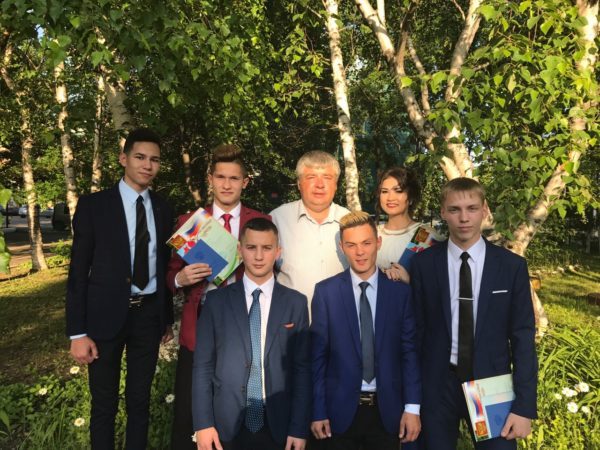
Graduation
If You Are a Grown-Up, Prove It
Igor Zhovnirenko graduated from the Ussuriysk Pedagogical University (Ussuriysk is a city in Primorsky Krai). Starting from his fourth year, he worked at two schools at the same time and was a homeroom teacher for two classes. He was noticed in educational area several times: he won a city contest “Bonzer Homeroom Teacher” and took third place in a young teachers contest. He dreamed of devoting himself to teaching children, and maybe, become a school director.
The young Zhovnirenko did not even know of an orphanage in Ussuriysk and never really thought about children who did not have parents. After his service in the army, he worked at a school for one more year. Later the administration of the Ussuriysk Education Department offered him a position of an orphanage director. Mr. Zhovnirenko thought about the offer for a whole month and finally decided that it was important to meet their expectations.
He noted that initially he sat in his office and did not know what to do:
– I understood that I had a great responsibility for the children’s lives. Many things depended on my decisions. It was a hard time, 1999: people did not get their salaries in Russia, they had no money, only few people adopted children or became their guardians, and there were several foreign families interested only in infants,– Mr. Zhovnirenko recalled. – Despite all difficulties and doubts, I stayed, because I had seen that children were drawn to me. They came to me to introduce themselves. They warily took a peek in my office, but showed interest. I invited them to come in and tell me about themselves. Later pupils started to gather in my office in large numbers so that there was no place to sit. They talked about their problems and told me their secrets. I realized that I reached an understanding with them and that I am needed.
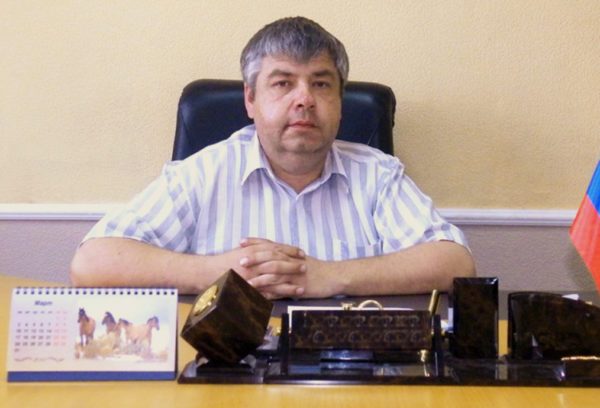
Igor Zhovnirenko
At present, Mr. Zhovnirenko is in charge of the Adoption Assistance Center for orphans and children deprived of parental care, which was founded after two orphanages joined together in 2010 in Ussuriysk. He became the director at the age of 25.
First two years of his work, he came to the center by 6 a.m., so that the pupils could see him when they woke up. He left at 11 p.m., when the pupils fell asleep. There were procedures that Mr. Zhovnirenko did not agree with. After much time, he managed to implement new procedures.
There is a supply depot near the orphanage. Most of the boys went there mostly to steel. Igor Zhovnirenko went to the depot several times a night to catch the slackers and took them back to the orphanage. The older boys dominated everyone, especially girls. The new director fought against it.
– Gradually the boys stopped running away, because they started to feel ashamed that I was looking for them at night.
I decided that I had to earn the pupils’ trust, so that they did not consider me to be simply a director, but a friend too, so that we could talk almost as equals.
I talked to them constantly explaining that steeling and bulling the girls or younger boys were wrong. It helped that I studied psychology at the university and worked at school, where I gained experience of talking to teenagers and learned their interests and values. Therefore I spoke their language in the orphanage. I guess that was how I won them over.
Sometimes the director had to make concessions to pupils. They made their demands and Igor Zhovnirenko made his. For example, a boy wanted permission to go to the movies with friends on the weekends. Mr. Zhovnirenko agreed on condition that the boy would get up early if it snowed and would help clean the yard from it. His idea is that if one feels mature, one should prove to be mature about everything, not just about spending time with friends.
– I realized that the boys became men, when I saw them shoveling the snow in the yard in freezing weather at 6.30 in the morning. They voluntarily asked educators on the night shift to wake them up earlier in case it snowed at night. The younger children followed the older ones’ example and helped too.
First Place Not Out Of Pity For Being an Orphan
Children should have someone whose example they could follow, therefore Mr. Zhovnirenko set himself an aim to become an example. It is a serious problem to make an older boy sing or dance, but if the director joins the choir the entire orphanage starts to sing. Likewise, if the director dances, the older boys stand next and dance as well. Mr. Zhovnirenko organized football teams and a humor club so that the pupils had something to channel their energy into. He always participated in everything personally:
– Every pupil feels a responsibility to the orphanage. For example, if the orphanage participates in an event and a pupil is dancing, singing or playing football, they understand that they do not represent themselves, but the whole orphanage. The pupils’ aim is to make their home famous. I taught them to be maximalists, “I came, I saw, I conquered.” If we did not take the first place, it is a defeat and a stimulus to improvement. One should practice and win regardless. It is important to impose the idea of success on a child. They should be aware of the fact they won not out of pity for being orphans, but because they practiced hard and put their effort into it, and therefore earned it.

Orphanage Football Team
Thanks to Mr. Zhovnirenko, the team of teachers has become an efficient group of like-minded people. Igor Zhovnirenko believes that the best approach to working with colleagues is to trust more and to control quietly. For example, he watches his colleagues from the sidelines how they keep their distance and follow certain methods. He said it is crucial to create a system, but the most important thing is for the pupils to feel needed and to be treated honestly.
– For every five educators who came to work here only one remains. It does not mean we do not take the others, but they quit. However, the person that managed to connect with the pupils stays with us forever. Children show their attitude in behavior and a lack of discipline.
If pupils find an educator to be not stylish, not interesting and boring, they will not listen to them. The children will test the educator in every way mocking him or her. As a result, the educator will not be able to cope with it and will leave.
Likewise, there are certain obstacles such as authoritarian, inattentive or pretentious attitude, or a too depressed personality.
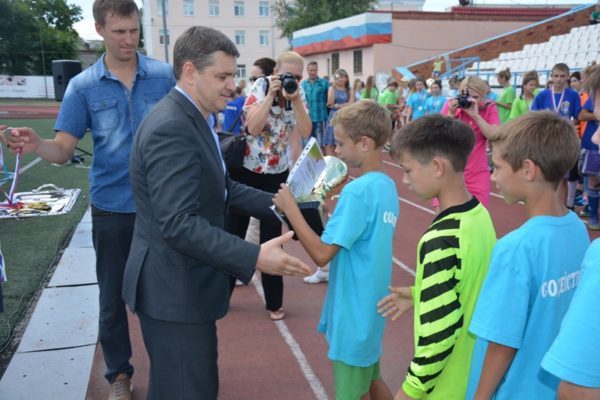
Being Awarded By Head of Ussuriysk
We Will Not Take Girls To Harvest Potatoes
Igor Zhovnirenko does not think it is essential to have a strict daily schedule, because he believes it is better to create a homelike atmosphere as much as possible. There are no classes on Saturdays, which means that one can watch movies until 1 a.m. and sleep in the next day. A breakfast is left in the refectory for those who do not get up early in the morning. Mr. Zhovnirenko has a strong opinion about treating younger children and assigning responsibilities between boys and girls.
Often a newcomer is shy even about going to the refectory to have a meal and all pupils know that they should help him or her integrate into the group. Children often sit next to the newcomer in the refectory or bring a meal to their group, or arrange a tour of the building showing the newcomer where the refectory, first aid room, bathrooms etc. are situated.
– It is crucial for a newcomer to feel being taken care of not merely by an educator, but by someone like him or her. This helps a newcomer adapt fast and feel like home within a couple of days, – Mr. Zhovnirenko pointed out. – Everyone in the orphanage understands their role. The more masculine a boy is educated to be, the more feminine a girl near becomes. Girls should feel treasured. Then they will choose boys who will treat them the same way, after they leave the orphanage. Older boys do hard physical work and girls iron and hang curtains. We will not take them to harvest potatoes in the field.
Often teenagers come to the orphanage and initially continue to lead the wrong lifestyle which they are used to. For example, they steal, lie, leave without permission, try to bully the younger children, skip classes, but this behavior does not last long. The reason is that they do not receive support from the group. Therefore, they start to follow the existing rules involuntarily.
– I agree with Makarenko’s idea about collective upbringing. We will always support it.
If a newcomer lights a cigarette in the bedroom, their roommate will immediately tell them that it is unacceptable. Such reproof given by a peer is more effective than the same one given by an adult.
It is very difficult to organize such collective upbringing meanwhile preserving self-awareness. God helps those who help themselves and therefore we do our best.
Children Get in Line to Work
At the beginning of Igor Zhovnirenko’s job, children shared welfare mentality: they were careless about their surroundings and even their clothes. They did not value anything and considered everything to be shared, not their own.
– A few decades back, pupils of orphanages left with a clear feeling that being an orphan was convenient. This was their misfortune. They used their situation as an excuse for any failure. For example, when they did not work or stole something, they thought “oh well, I am an orphan”. I figured it was essential to rent a piece of land and work there with the pupils. At first, we planted a field with various crops in a collective farm. Later the president of the Academy of Agricultural Sciences offered an area of land near the orphanage. It has already been fifteen years since we started working as a farming crew with the older children. We harvest potatoes, beets, carrots, etc. We pickle tomatoes and store them and the rest of the harvest in the cellar to preserve it until winter.
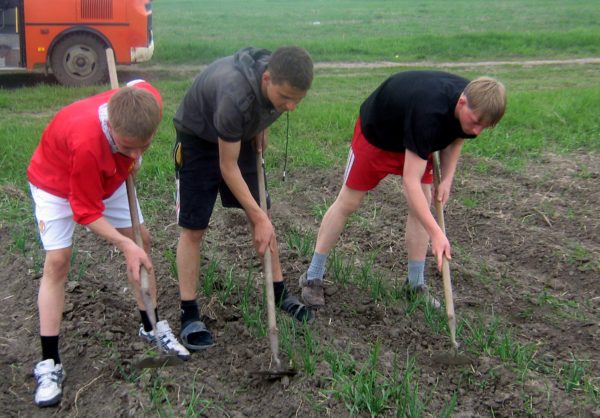
Work in The Field
The director opens a temporary position of vegetable farmer for three months in the orphanage, then hires children through an employment agency and pays them a salary.
– The pupils are raised in such a way, they would do this job for free with understanding they would do this for their own sake. However any work should be paid for and we have an opportunity to motivate children. Likewise, we appoint them in a construction crew, there are also positions of cleaner and street sweeper. Everyone wants to work. They get in line for it, – the director pointed out.
Like any children, the pupils spend their earnings on a pizza and chocolate. They also buy fashionable ripped jeans or colorful hoodies at a night market. Some teenagers go to a hairdresser to have an expensive haircut.
The director is positive that modern young people cannot spend money in a smart way, including children both raised in a children’s home and a family.
Having enrolled in a college in another city, any student spends their monthly allowance within two days and becomes hungry for the rest of the month. Market economy had its effect. The older generation has its understanding of money and its value, and the youth has another opinion. This results in incomprehension.
According to Mr. Zhovnirenko, 90% of boys of the orphanage are suitable for military service. When they return from this service they are stronger and muscular. Smart and beautiful girls start families. It is very crucial that foster children do not lower themselves to the level of their parents. The director tells his pupils the truth about their parents.
– It is very important for a child to know the truth about their parents. Affectation or insincerity only pushes the children away. We retrieve documents, make requests and tell a child the truth. Sometimes we organize a meeting between parents and their children. Occasionally parents do not want to meet and it is very difficult and sad for their child. I always support them at times like these. I give them a hug and let them feel how much I care. I explain to them what alcoholism and drug addictions are. My first aim is for the children to say that they will never be the same and will try not to repeat their parents’ mistakes.
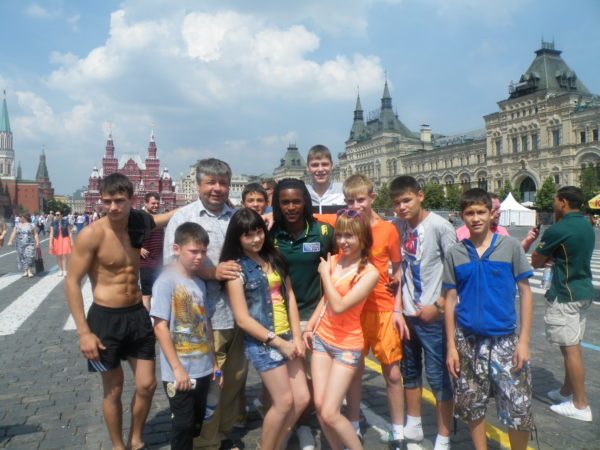
In Moscow
Took a Child to Your Home – They Are Yours Forever
Question: What advice would you give to parents who want to take a child from an orphanage, but hesitate?
Answer: If one wants to adopt a child, one should not wait for the beginning of winter, spring, the end of repair work, or the time one would move in their own place. One should live with one’s problems and not be afraid of them. Whatever happens, a parent should be with their child, help in everything, raise and educate. Many people are afraid of the genes and heredity, but this is nonsense. However, if foster parents occasionally think they will return the child if they fail, they should not take a child at all. There should not be any doubts, if you took a child to your home, he or she is yours forever.
At present time, the number of foster children increase, because many efforts are put into this. We publish information in the mass media, participate in special events in which we can show our pupils. Last year thirty two children found their families. It used to be around seven to ten children a year. The number of children in the orphanage has also decreased from 200 to 120.
There have been 500 graduates for the eighteen years of Mr. Zhovnirenko’s work. Most of the graduates keep in touch with the children’s home. The director mentioned that those who do not call or come to the orphanage are more often ashamed of their mistakes:
– I always believe in children and expect only good from them. Most importantly, one should teach a child to respect themselves and other people and to have healthy self-esteem.
There was a boy who would run away and spend a night at platforms, but he grew up and now have two diplomas of higher education. Children dream to become teachers, sailors, railwaymen, and artists. Currently many children wish to work in oil and gas industry. We have already found institutes which educate such specialists. We will prepare our pupils to enroll there.
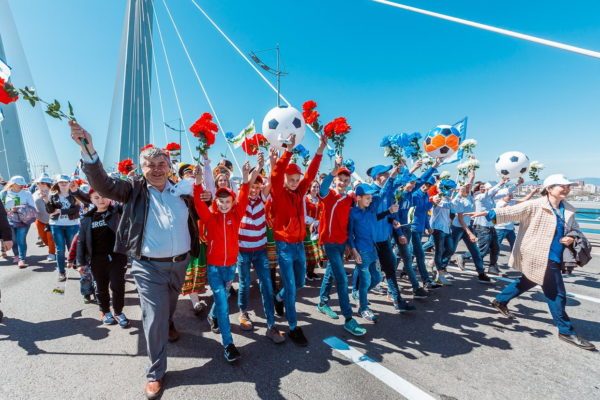
Participation in a Demonstration in Vladivostok on May 1
Igor Zhovnirenko believes that today’s system of Russian orphanages is quite flexible and beneficial for children. A situation with orphans receiving apartments has changed for the last three years in Primorsky Krai. The times when orphans received awful apartments or none at all have passed. Orphans receive a place of residence within a year. Some local governments assign an apartment at a special new building.
The director pointed out that he feared less for the future of the pupils:
– At the present time, I am not afraid of anything. I used to worry about children’s future after graduation, because we do cherish them in the orphanage. Now I see that many graduates are self-confident and live fine on their own. They know that they can call me anytime, and they often do. If I am busy, I will at least text them. If there is no news for a long time, I call them myself.
This article was translated from Russian












